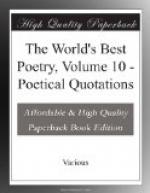Quaint old Thomas Fuller gives a pretty simile when he says that “Poetry is music in words, and music is poetry in sound”; and, in so far as melodious form and harmonious thought express and arouse emotion, he gives a hint of the truth.
The German Jean Paul Richter says an admirable thing: “There are so many tender and holy emotions flying about in our inward world, which, like angels, can never assume the body of an outward act; so many rich and lovely flowers spring up, which bear no seed, that it is a happiness poetry was invented, which receives into its limbus all these incorporeal spirits, and the perfume of all these flowers.” True: but the tremendous domain of Tragedy—emotion neither holy nor tender—has been most fruitful of poetic power, and that finds here no recognition.
Edmund Burke’s rather disparaging remark that poetry is “the art of substituting shadows, and of lending existence to nothing,” has yet a vital suggestion, reminding one of Shakespeare’s graphic touch in “The Tempest”:
“And, as imagination bodies forth
The forms of things unknown, the poet’s
pen
Turns them to shapes, and gives to airy
nothings
A local habitation and a name”;
and this again recalls in Holy Writ that clarifying description of the imaginative power of “seeing the invisible” which is called “faith,” as being “the substance of things hoped for, the evidence of things not seen.”
These varied sayings concern the elements of poetry, and help to an apprehension of its scope and power; yet they but partially satisfy the desire to know what is meant by that familiar word,—which we constantly use, and use understandingly, while yet the very makers of poetry find difficulty in telling just what is signified by it.




